The Comprehensive Guide to the Brussels Griffon Dog
 Welcome to the definitive guide to the captivating world of Brussels Griffon Dogs. In this meticulously crafted compendium, we embark on a journey that delves deep into every facet of this remarkable canine companion. From their origins and historical significance to their unique characteristics, care requirements, and the joys of sharing your life with them, this guide is your ultimate resource for becoming a true connoisseur of the Brussels Griffon breed.
Welcome to the definitive guide to the captivating world of Brussels Griffon Dogs. In this meticulously crafted compendium, we embark on a journey that delves deep into every facet of this remarkable canine companion. From their origins and historical significance to their unique characteristics, care requirements, and the joys of sharing your life with them, this guide is your ultimate resource for becoming a true connoisseur of the Brussels Griffon breed.
Introduction
The Brussels Griffon Dog, with its endearing charm and distinctive appearance, is a breed that has captured the hearts of dog enthusiasts around the world. These small, yet captivating dogs have a history dating back centuries, and their journey through time is rich with anecdotes and significance. As we embark on this comprehensive exploration of the Brussels Griffon, let us immerse ourselves in the enchanting world of this breed and discover the intricacies that make it truly special.
Background and History
Origin and Development of the Brussels Griffon Dog
The Brussels Griffon's origin traces back to 17th-century Brussels, Belgium, where they were initially bred as skilled rat hunters in stables and homes. This breed's lineage is believed to include the Affenpinscher, Pug, and Toy English Toy Spaniel. Over time, selective breeding refined their appearance, resulting in the distinctive face and coat that define them today.
Historical Significance and Cultural Relevance
Throughout history, Brussels Griffon Dogs have found favor in various cultural contexts. From being cherished companions of European nobility to earning their keep as adept vermin hunters, their adaptability and charm have allowed them to carve a unique place in the hearts of people across the globe.
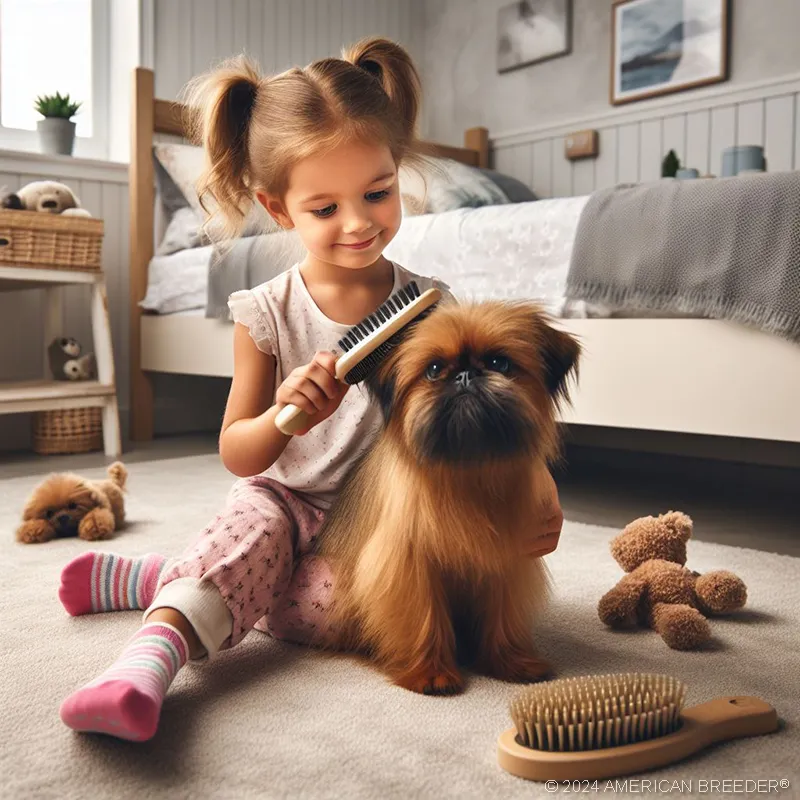 Purpose and Original Use of the Brussels Griffon
Purpose and Original Use of the Brussels Griffon
Originally bred for practical purposes such as ratting and companionship, Brussels Griffon Dogs evolved into cherished lapdogs. Their small size made them ideal for living in urban settings, endearing them to city dwellers. Their lively personalities and ability to form strong bonds with their owners further solidified their role as beloved companions.
Kennel Clubs and Recognition
In 1883, the American Kennel Club (AKC) recognized the Brussels Griffon as a distinct breed. Since then, these dogs have gained popularity and have been classified within the Toy Group due to their size and charm. Their recognition by prestigious kennel clubs underscores their significance in the world of purebred dogs.
Appearance and Distinctive Features
Size, Weight, and Physical Appearance
Brussels Griffon Dogs are small in stature but big in personality. They typically weigh between 8 to 12 pounds and stand about 7 to 12 inches tall at the shoulder. Their compact frame, expressive eyes, and unique facial structure give them an endearing and almost human-like appearance that draws admirers in.
Coat Type, Color Variations, and Patterns
The Brussels Griffon comes in two coat types: rough and smooth. The rough-coated variety has a wiry and dense outer coat that gives them a tousled appearance, while the smooth-coated type boasts a short, glossy coat. Coat colors vary and include red, black, belge (a mix of black and reddish-brown), and a combination of these colors.
Distinctive Features and Markings
One of the breed's most iconic features is its short, pushed-in face, known as a brachycephalic muzzle. This unique trait, coupled with their expressive large eyes, gives them an almost comical and perpetually surprised expression that never fails to elicit smiles from onlookers.
Temperament and Personality
Typical Temperament Traits and Behavior Tendencies
Brussels Griffon Dogs are known for their vibrant personalities and distinctive behaviors. They are often affectionate and devoted to their human companions, seeking constant companionship and forming strong bonds. Despite their small size, they exhibit confidence and can even display a touch of stubbornness.
 Energy Levels and Activity Requirements
Energy Levels and Activity Requirements
These dogs may be small, but they pack a lot of energy. They enjoy playtime, short walks, and mental stimulation. However, they are equally content curling up on your lap for a cozy snuggle session. Striking a balance between physical activity and quiet moments is essential to keep them both physically and emotionally content.
Compatibility with Different Lifestyles and Family Dynamics
Brussels Griffon Dogs are versatile companions who can adapt to various living situations. Their small size makes them suitable for apartments, but they also enjoy the freedom of a house with a yard. Their affectionate nature makes them excellent companions for singles, couples, and families with older children who understand how to handle small dogs delicately.
List of Typical Behavior Issues
While Brussels Griffon Dogs are charming and delightful, like all breeds, they can exhibit certain behavior challenges. Addressing these challenges through consistent training, positive reinforcement, and providing appropriate outlets for their energy is crucial to ensuring a harmonious relationship between you and your furry friend.
Aggression and Biting: Some Brussels Griffons may display aggression if not socialized properly. Early socialization and positive training are essential to prevent aggressive behaviors.
Excessive Barking: Due to their alert nature, they can be prone to barking at perceived threats or changes in their environment. Training to control barking can help maintain peace.
Digging Behavior: A remnant of their rat-hunting days, some Brussels Griffons may enjoy digging. Providing designated digging areas can help channel this instinct.
Separation Anxiety: These dogs form strong attachments and may struggle with separation anxiety. Gradual training to tolerate alone time and the use of enrichment toys can mitigate this issue.
Resource Guarding: Like many dogs, they might exhibit resource-guarding tendencies. Early training and positive reinforcement can help address this behavior.
Fear and Phobias: Brussels Griffon Dogs can be sensitive to loud noises or unfamiliar environments, leading to fear and anxiety. Gentle exposure and gradual desensitization can help them overcome these fears.
Trainability and Intelligence
Trainability Level and Ease of Learning
Brussels Griffon Dogs possess intelligence and a willingness to please, making them trainable and eager learners. Their responsiveness to positive reinforcement methods makes training an enjoyable and rewarding experience for both dog and owner.
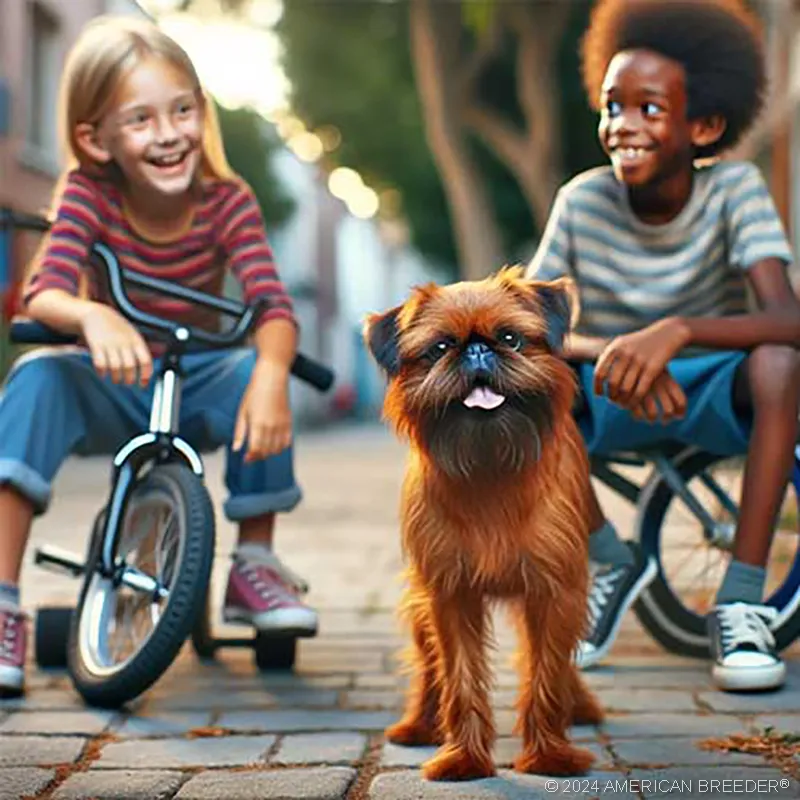 Will to Please Their Owner
Will to Please Their Owner
The Brussels Griffon's desire to please their owner is a heartwarming characteristic that fosters strong bonds between dog and human. They thrive on positive reinforcement, which means that they are more likely to respond well to training methods that focus on rewards, treats, and praise. This eagerness to make their owner happy can turn training sessions into enjoyable and productive experiences.
Intelligence and Problem-Solving Abilities
Ranked among the intelligent dog breeds, Brussels Griffons have an innate curiosity that drives their problem-solving abilities. They enjoy mental challenges and interactive games that stimulate their minds. Providing puzzle toys and engaging them in activities that require problem-solving can help keep their intellect sharp and prevent boredom.
Recommended Training Approaches and Techniques
Positive reinforcement is the cornerstone of effective training for Brussels Griffon Dogs. Using rewards like treats, toys, and verbal praise when they exhibit desired behaviors encourages them to repeat those actions. Harsh training methods or punishment-based approaches can lead to anxiety and distrust. Consistency, patience, and understanding are key when training these sensitive and intelligent dogs.
Training or Skills Suited for Brussels Griffon Dogs
Given their small size and adaptable nature, Brussels Griffon Dogs excel in various training areas. Some common skills they can master include basic obedience commands (sit, stay, come), leash walking, and even advanced tricks like fetching specific items or performing agility tasks. Tailoring training sessions to their energy levels and abilities ensures successful outcomes and a harmonious owner-dog relationship.
Practical Considerations
Size of Sleeping Quarters and Living Arrangements
Brussels Griffon Dogs can comfortably live in apartments, houses, and rural areas, adapting well to different environments. Due to their small size, they require minimal space indoors, but regular exercise and mental stimulation are essential to keep them happy and healthy.
 Typical Annual Veterinary Cost
Typical Annual Veterinary Cost
While the Brussels Griffon is generally healthy, regular veterinary check-ups are important to catch any potential issues early. Vaccinations, dental care, and preventive measures like flea and tick control contribute to the overall well-being of your furry friend. Budgeting for routine vet visits and unforeseen medical expenses is part of responsible pet ownership.
Type of Grooming and Maintenance
Grooming requirements vary based on the coat type. Rough-coated Brussels Griffons need regular brushing to prevent matting, while smooth-coated varieties require less maintenance. Regular nail trimming, ear cleaning, and dental care are also crucial for their overall health. Engaging in a grooming routine fosters a strong bond between you and your dog and keeps them looking their best.
Daily Exercise Needs and Requirements
Brussels Griffon Dogs enjoy moderate exercise, which includes short walks, playtime, and mental enrichment. Interactive games, puzzle toys, and even simple training sessions can satisfy their need for mental stimulation. Balancing physical and mental activities helps prevent behavioral issues and keeps them content.
Feeding Requirements and Dietary Considerations
A balanced diet is essential for a Brussels Griffon's overall health. Consult with your veterinarian to determine appropriate portion sizes and types of food. High-quality dog food with balanced nutrients, appropriate for their age and size, is crucial. Keep treats in moderation and avoid feeding them human foods that can be harmful to dogs.
Health and Care
Common Health Issues and Predispositions
Like all breeds, Brussels Griffon Dogs are susceptible to certain health issues. Brachycephalic obstructive airway syndrome (BOAS), dental problems, luxating patella, and eye issues are some concerns associated with the breed. Regular veterinary check-ups and preventive measures can help manage and address these potential health challenges.
 Allergies and Specific Dietary Considerations
Allergies and Specific Dietary Considerations
Brussels Griffons can be prone to allergies, which may manifest as skin issues or gastrointestinal problems. Identifying allergens and adjusting their diet accordingly can alleviate discomfort. Consult your veterinarian if you suspect your dog has allergies to determine the appropriate dietary changes.
Lifespan and Longevity Expectations
With proper care, Brussels Griffon Dogs have an average lifespan of 12 to 15 years. Regular exercise, a balanced diet, preventive healthcare, and regular vet visits contribute to their longevity. Ensuring their well-being extends their years of companionship and joy.
Vaccination Schedule and Preventive Care
Following a recommended vaccination schedule is vital to protect your Brussels Griffon from common canine diseases. Core vaccines, which include rabies, distemper, and parvovirus, are essential to their overall health. Additionally, non-core vaccines and preventive measures against parasites are essential to their well-being.
Regular Health Check-ups and Vet Visits
Regular veterinary check-ups are crucial to monitor your Brussels Griffon's health, catch any potential issues early, and ensure they are up to date on vaccinations. Establishing a strong relationship with a trusted veterinarian fosters a proactive approach to their well-being.
Socialization and Compatibility
Interaction with Children, Other Pets, and Strangers
Brussels Griffon Dogs can be excellent companions for families with older children who understand how to handle small dogs gently. Proper socialization from a young age helps them develop positive interactions with children, other pets, and strangers. Supervised introductions and positive experiences shape their behavior
 Socialization Needs and Tips
Socialization Needs and Tips
Early and continuous socialization is crucial for Brussels Griffon Dogs to develop into well-rounded and confident individuals. Exposing them to various environments, people, animals, and experiences from a young age helps prevent fear-based behaviors and anxiety. Gradual exposure, positive reinforcement, and consistency are key to successful socialization.
Precautions in Multi-Dog Households
Brussels Griffon Dogs generally get along well with other dogs when properly introduced and socialized. However, their small size can make them vulnerable to injury during rough play with larger dogs. Supervision and providing a safe space for retreat are important to ensure harmonious interactions in multi-dog households.
Ease of Training and Social Compatibility
The Brussels Griffon's intelligence and eagerness to please make them relatively easy to train. Their small size and adaptability also contribute to their compatibility with various training methods. However, their sensitivity requires a gentle approach to prevent anxiety and behavioral issues. Building trust through positive reinforcement fosters a strong training bond.
Playtime and Exercise with Other Dogs or Pets
Brussels Griffon Dogs often enjoy playtime with other dogs, especially those of similar size and energy levels. Supervised playdates and interactions with other dogs provide mental stimulation and companionship. However, always observe their interactions closely to ensure safety and prevent any signs of aggression or discomfort.
Dog-Friendly Activities and Outings
These social and adaptable dogs are likely to enjoy outings and activities with their owners. Exploring dog-friendly parks, participating in training classes, and attending pet-friendly events can provide mental and physical stimulation. Bonding over shared experiences enhances your relationship and enriches their lives.
Living Arrangements and Environment
 Suitability for Different Living Arrangements
Suitability for Different Living Arrangements
Brussels Griffon Dogs adapt well to various living environments, from apartments to houses with yards. Their small size and moderate exercise needs make them versatile companions for urban and suburban dwellers alike. However, ensuring regular exercise and mental stimulation is vital, regardless of the living space.
Space Requirements and Exercise Options
While they don't require large living spaces, Brussels Griffon Dogs do benefit from daily exercise and mental stimulation. Short walks, interactive play sessions, and engaging toys provide outlets for their energy and curiosity. Creating a dog-friendly environment at home with cozy beds, interactive toys, and designated play areas contributes to their well-being.
Climate Considerations and Adaptability
Brussels Griffon Dogs are adaptable to various climates, but their sensitivity to extreme temperatures, especially heat, requires precautions. During hot weather, provide shade, fresh water, and avoid walks during the hottest hours. In colder climates, consider dressing them in warm clothing to protect them from the cold.
Recommended Yard Size for Brussels Griffon Dogs
While a yard isn't a strict requirement, having access to a small yard can provide Brussels Griffon Dogs with additional space to explore and play. Ensuring the yard is securely fenced prevents them from wandering and provides a safe environment for them to enjoy outdoor activities.
Ideal Living Conditions and Environment
Brussels Griffon Dogs thrive in a loving and attentive home environment where they receive regular companionship, mental stimulation, and proper care. A comfortable indoor space, opportunities for play and exploration, and a strong bond with their owner contribute to their happiness and well-being.
Training and Obedience
Basic Obedience Training and Commands
Basic obedience training is an essential foundation for a well-behaved Brussels Griffon. Teaching commands like sit, stay, come, and walking on a leash are not only practical but also foster communication and a strong bond between you and your dog. Consistent training and positive reinforcement methods lead to successful results.
 Advanced Training and Specialized Activities
Advanced Training and Specialized Activities
Brussels Griffon Dogs have the potential to excel in advanced training and specialized activities. From agility and obedience trials to therapy dog work, their intelligence, and eagerness to please make them versatile candidates for various dog sports and roles. Tailoring training to their abilities and interests enhances their overall satisfaction and skills.
Behavioral Challenges and Training Considerations
Addressing behavioral challenges through training is essential to maintain a harmonious relationship with your Brussels Griffon. Consistency, positive reinforcement, and patience are key when addressing challenges like barking, separation anxiety, and resource guarding. Seeking professional guidance when needed can help you navigate and overcome these challenges effectively.
House and Potty Training Tips
Consistent and positive reinforcement-based house training is crucial when bringing a Brussels Griffon puppy into your home. Establish a routine for bathroom breaks, praise them for eliminating outside, and avoid punishment for accidents. Providing clear guidance and patience will help them learn quickly and effectively.
Leash Training and Walking Etiquette
Leash training is important for safe and enjoyable walks with your Brussels Griffon. Begin with short, positive sessions and reward good behavior with treats and praise. Using a harness can prevent strain on their delicate neck and throat. Encouraging loose leash walking and positive social interactions during walks creates a positive experience for both you and your dog.
Exercise and Activity
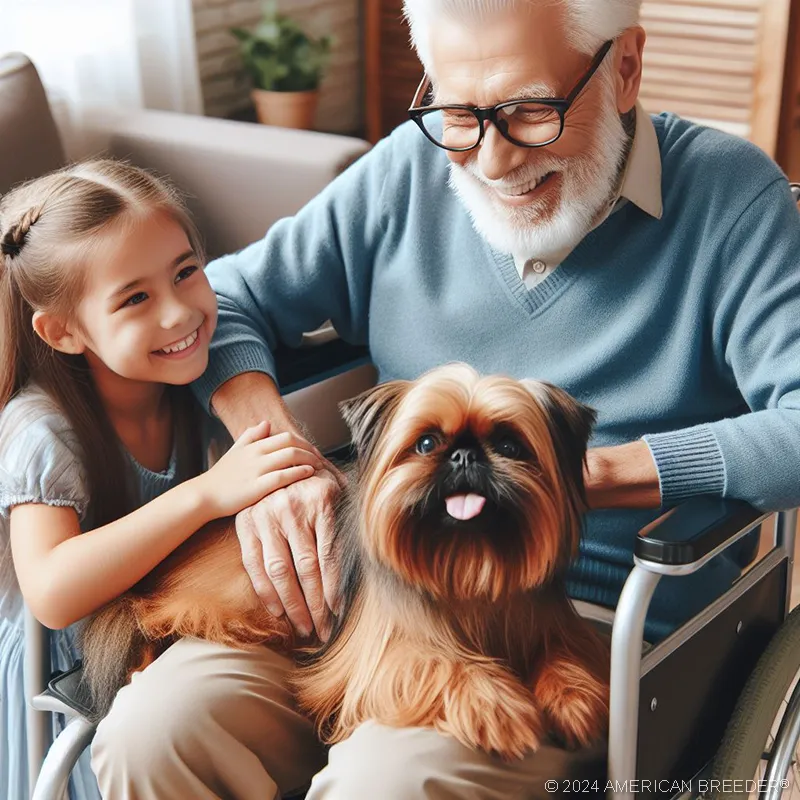 Daily Exercise Needs and Recommendations
Daily Exercise Needs and Recommendations
Brussels Griffon Dogs thrive with a balanced exercise routine that includes both physical and mental activities. Short walks, playtime, and interactive games satisfy their energy needs. Engaging them in mental challenges like puzzle toys and training sessions prevents boredom and enhances their cognitive abilities.
Mental Stimulation Activities and Games
Stimulating your Brussels Griffon's mind is just as important as physical exercise. Puzzle toys, hide-and-seek games, and interactive treat-dispensing toys keep them mentally engaged. These activities not only prevent boredom but also strengthen their problem-solving skills and cognitive abilities.
Exercise Routines and Activity Ideas
Designing a diverse exercise routine for your Brussels Griffon keeps them engaged and excited. Mix short walks, indoor play sessions, and mental challenges throughout the day. Varying activities prevent monotony and ensure their physical and mental well-being.
Energy Outlets for High-Energy Breeds
While Brussels Griffon Dogs are not high-energy breeds, they still benefit from activities that engage their minds and bodies. Short bursts of play, training sessions, and mental stimulation games provide the necessary outlets to prevent behavioral issues that can arise from pent-up energy.
Financial Planning and Responsibility
Typical Price Range for Purchasing from Reputable Breeders
Brussels Griffon Dogs from reputable breeders can range in price depending on factors like pedigree, coat type, and breeder reputation. It's important to research breeders thoroughly and ensure they prioritize the health and well-being of their dogs.
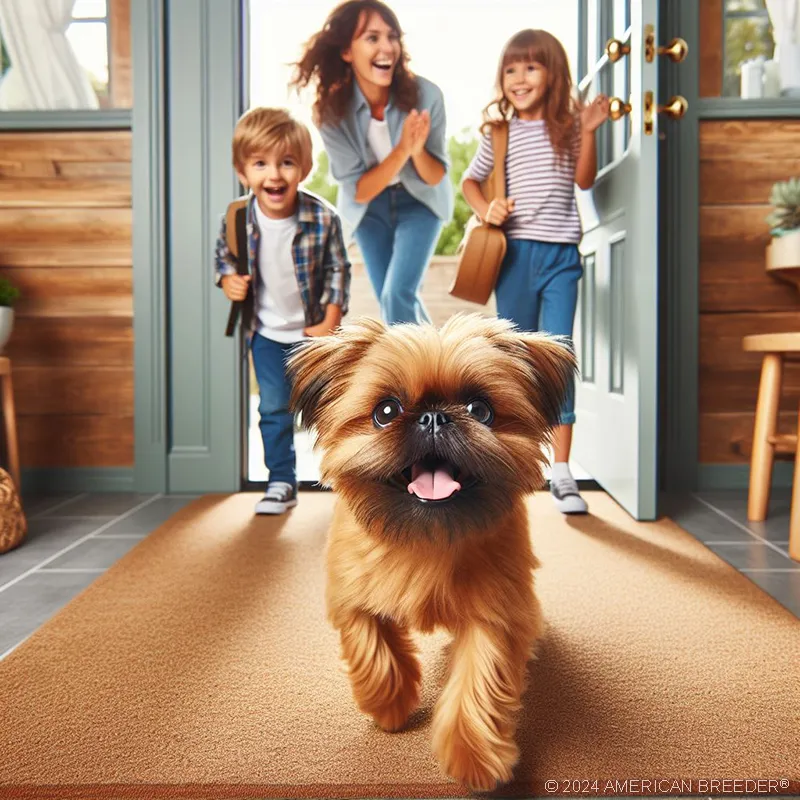 Initial Costs and Ongoing Expenses
Initial Costs and Ongoing Expenses
Beyond the purchase price, initial costs include essential items like a collar, leash, crate, toys, and bedding. Ongoing expenses encompass high-quality dog food, routine vet visits, vaccinations, grooming, and potential emergencies. Planning for these costs is crucial to providing proper care for your Brussels Griffon.
Pet Insurance and Budgeting for Medical Costs
Pet insurance can provide peace of mind and financial security when it comes to unexpected medical expenses. Researching different insurance options and choosing a plan that aligns with your budget and your Brussels Griffon's potential health needs can alleviate financial strain during emergencies.
Budgeting for Grooming and Maintenance
Grooming expenses include regular brushing, nail trimming, ear cleaning, and occasional professional grooming appointments. Setting aside a budget for grooming ensures your Brussels Griffon's coat remains healthy, free from matting, and aesthetically pleasing.
Responsible Ownership and Financial Preparedness
Being a responsible owner involves understanding the financial commitment required to care for a Brussels Griffon throughout their life. Planning ahead, budgeting for routine and unforeseen expenses, and having an emergency fund in place guarantee that your dog receives the care they deserve, without compromising their well-being due to financial constraints.
Cost-Effective Ways to Provide Quality Care
While providing quality care is a priority, there are cost-effective ways to ensure your Brussels Griffon's well-being. Purchasing high-quality dog food in bulk, learning basic grooming skills, and engaging in preventative healthcare measures can help you provide excellent care without overspending.
Sharing Your Life with a Brussels Griffon
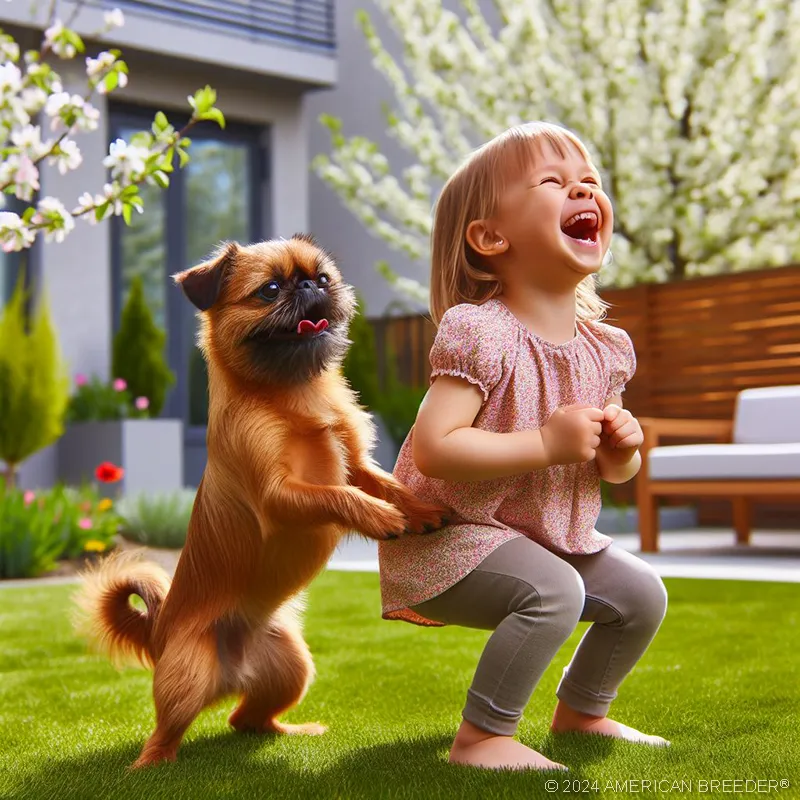 Emotional Bond and Companionship
Emotional Bond and Companionship
The bond between a Brussels Griffon and their owner is characterized by unwavering loyalty and companionship. Their affectionate nature, eagerness to please, and intuitive understanding of human emotions make them exceptional emotional support animals. Sharing your life with a Brussels Griffon is a rewarding experience that enriches both your lives.
Incorporating Them into Your Lifestyle
Brussels Griffon Dogs seamlessly integrate into various lifestyles, whether you're a busy professional, a retiree, a single person, or part of a family. Their adaptable nature allows them to thrive in different environments, making them ideal companions for urban and suburban living.
Traveling with Your Brussels Griffon
Brussels Griffon Dogs can make wonderful travel companions, thanks to their small size and adaptability. Whether embarking on road trips, vacations, or even short outings, they enjoy exploring new environments with their owners. Planning ahead and ensuring their comfort during travel creates positive experiences for both you and your dog.
Building Memories and Experiences Together
Creating cherished memories with your Brussels Griffon is a natural outcome of sharing your life with them. From cozy evenings cuddled up on the couch to playful outdoor adventures, every moment spent together contributes to a strong and enduring bond.
The Enduring Legacy of Brussels Griffon Dogs
As you've journeyed through the extensive world of Brussels Griffon Dogs, you've gained a profound understanding of their history, personality, care needs, and the unparalleled joy they bring to our lives. This guidebook stands as a testament to the deep connection that exists between humans and these remarkable companions.
Brussels Griffon Dogs have left an indelible mark on the lives of countless individuals, from historical figures to modern families. Their unwavering loyalty, endearing quirks, and boundless love have touched the hearts of those fortunate enough to share their lives with them.
The legacy of Brussels Griffon Dogs continues to thrive as new generations discover the enchanting world of this breed. Whether you're a first-time owner or a seasoned enthusiast, the journey of understanding and appreciating these dogs is one that never truly ends. As you navigate the joys and challenges of dog ownership, may you always find inspiration, guidance, and companionship in the delightful presence of your Brussels Griffon.
Brussels Griffon Dog Quick Reference Guide
Breed Background: Origin: Belgium | Breed Purpose: Companion | AKC Class: Toy | Year Recognized by AKC: 1910
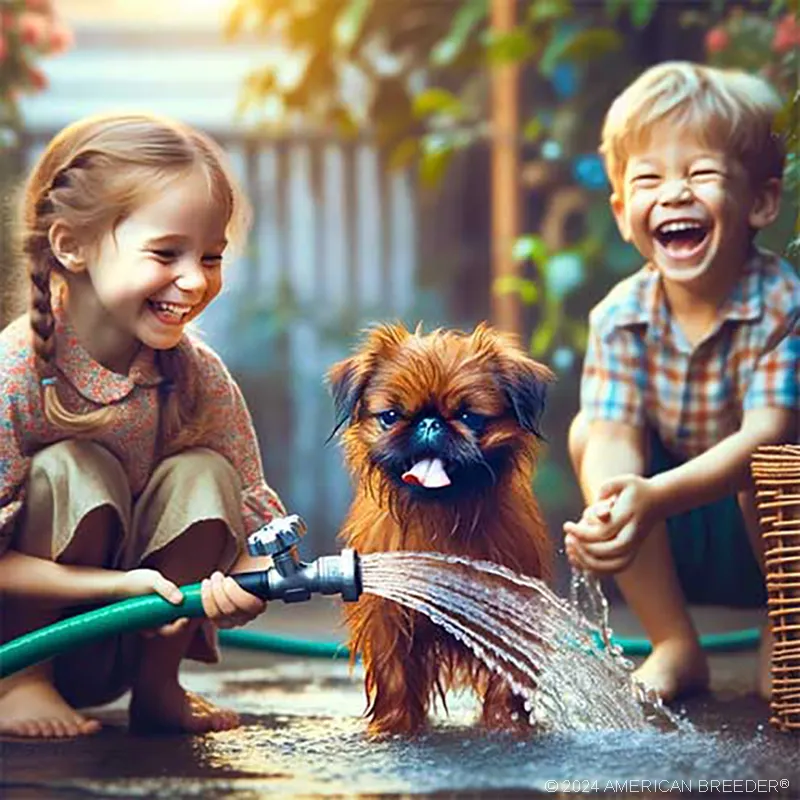 Appearance: Size: Small | Weight: 8-12 lbs | Coat Type: Smooth or Rough | Colors & Patterns: Black, black & tan, red, belge (black and reddish-brown mixture) | Distinctive Features: Short muzzle, expressive eyes
Appearance: Size: Small | Weight: 8-12 lbs | Coat Type: Smooth or Rough | Colors & Patterns: Black, black & tan, red, belge (black and reddish-brown mixture) | Distinctive Features: Short muzzle, expressive eyes
Temperament: Energy Level: 3 | Friendliness to Pets: 3 | Friendliness to Strangers: 3 | Trainability: 3 | Playfulness: 4 | Frequent Barker: 4 | Chase Instincts: 2 | Sense of Smell: 2 | Drive to Hunt: 2
Health & Care: Health Issues: Brachycephalic syndrome, luxating patellas | Lifespan: 12-15 years | Grooming Difficulty: Moderate | Exercise Needs: Moderate
Socialization: Interaction with Children: Cautious but can be good | Interaction with Pets: Variable, early socialization important | Interaction with Strangers: Reserved | Ease of Training: Moderate
Suitable Living Arrangements: Apartment: Yes | House: Yes | Rural Area: Yes | Yard Size Requirements: Small yard sufficient
Training & Obedience: Trainability: 3 | Intelligence: 3 | Obedience: 3 | Problem-Solving: 3 | Easily Stimulated: 4 | Focus Level: 3 | Easily Distracted: 3
Financial Planning: Typical Price Range: $800 - $4,000 | Initial Expenses: Crate, vaccinations, microchipping | Ongoing Annual Expenses: Food, grooming, veterinary care
Breeding: Reproductive Maturity: 6-9 months | Litter Frequency: 1-2 litters per year | Litter Size: 1-4 puppies | Stud Cost: $500 - $2,000 | Breeding Challenges: Small litter sizes, potential birthing difficulties
Did You Enjoy this Article? Share it and Help Us Spread the Word!
If you found this article helpful, we'd appreciate it if you could share it with your friends or link to it from your website, blog, or group! You can also use the convenient social share tabs on the left side of the screen to instantly share this page to your social media feed. For more ways to support and promote the American Breeder Community, visit our Share & Promote Together page for social media posts and memes you can copy and share. Your support means the world to us!
Disclaimer: The information provided in this article is for general informational purposes only and does not constitute legal, medical, financial, or professional advice. While we strive for accuracy, we make no representations or warranties regarding the completeness, accuracy, reliability, or suitability of the information. Please consult with a professional before making decisions based on the content provided. American Breeder Inc. assumes no responsibility for any errors or omissions or for the results obtained from the use of this information.
